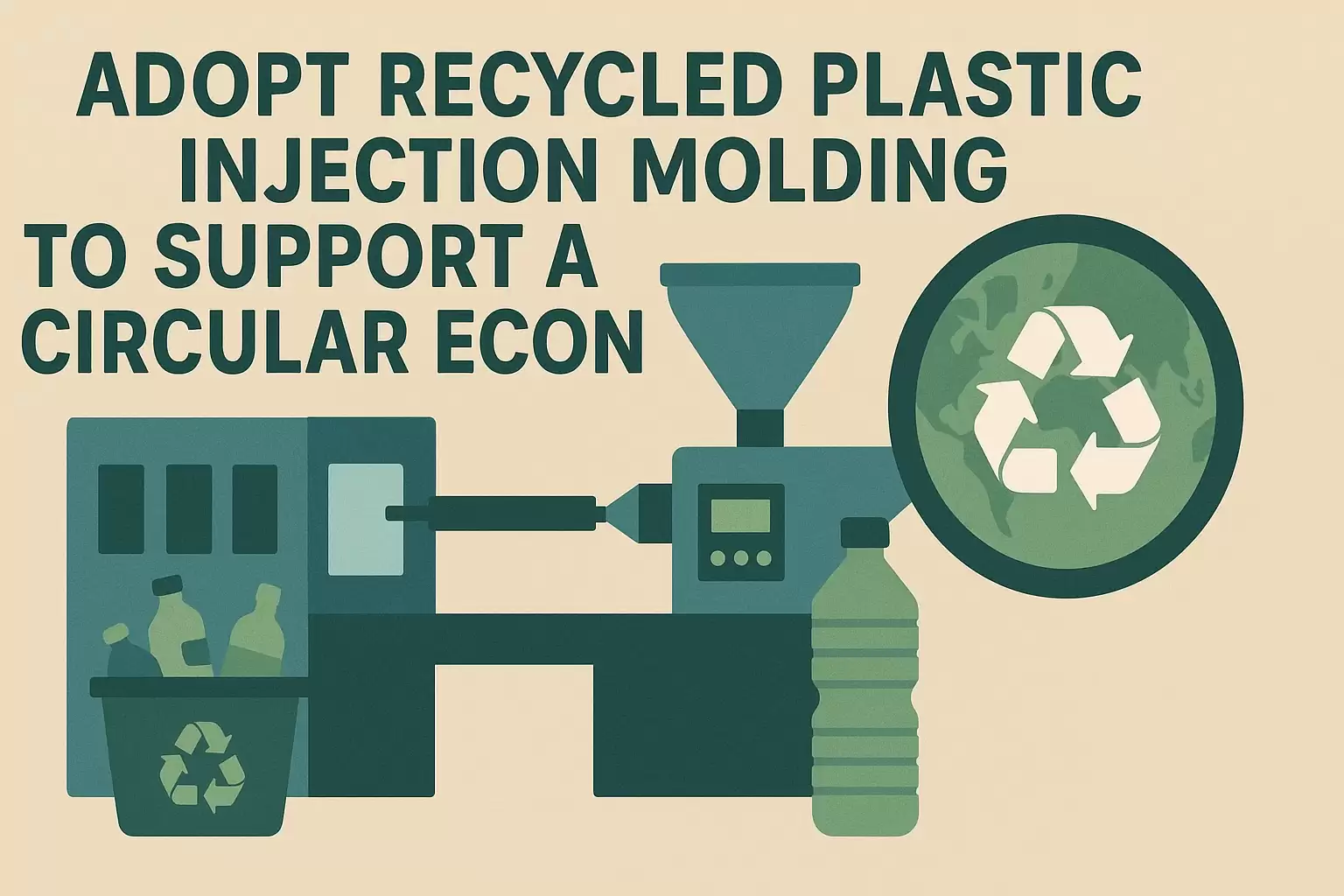Adopt Recycled Plastic Injection Molding to Support a Circular Economy
Adopt Recycled Plastic Injection Molding to Support a Circular Economy
Shifting from virgin polymers to PCR/PIR (post-consumer/post-industrial recycled) resins doesn’t have to mean sacrificing quality or speed. With the right design rules, process controls, and supplier traceability, recycled plastic injection molding can cut material cost, lower carbon footprint, and strengthen ESG reporting—all while maintaining Tier-1 performance. Here’s how TaiwanMoldMaker.com makes it practical from prototype to mass production.
1) Recycled Resin Options—What to Use and When
| Family | Recycled Grades to Consider | Strengths | Typical Uses |
|---|---|---|---|
| PP / PE | rPP, rHDPE, rLDPE | Balanced toughness, easy flow, widely available | Caps/closures, housings, storage |
| ABS / HIPS | rABS, rHIPS | Good impact and paintability | CE housings, TVs, appliances |
| PC & Blends | rPC, rPC/ABS | High impact, heat, clear/opaque options | Electronics, lighting, safety |
| PA 6/66 | rPA6/66 | Strength, wear, glass-filled options | Auto clips, gears, tool parts |
| PET / rPET | rPET (injection & compounding grades) | Clarity potential, good barrier | Cosmetic jars, trays, some caps |
Tip: Start with 10–30% PCR in legacy parts and ramp to 50–100% as color/tolerance targets are validated.
2) Design-for-Recycling (DfR) That Works in the Real World
-
Mono-material first: Prefer PP+TPE SEBS, ABS-only, or PC/ABS families to simplify recovery.
-
Avoid metal where possible: Replace screws with molded snap-fits or use overmolded plastic inserts.
-
NIR-detectable blacks: Use NIR-friendly masterbatch instead of carbon black to keep parts sortable.
-
Labeling & IML: Choose PP labels on PP parts; ditch incompatible adhesives.
-
Mark parts clearly: ISO resin ID marks (e.g., “>PP<”) and date/cavity codes aid takeback flows.
3) Processing Playbook for PCR Consistency
| Control Point | Why It Matters | Our Standard Practice |
|---|---|---|
| Moisture & Drying | Hygroscopic resins (PA, PET, PC) need dry to spec | Inline dew-point control; moisture logs per lot |
| MFI / Viscosity Variation | PCR streams vary by source | Incoming MFI test; adjust screw rpm & transfer |
| Filtration & Wear | PCR may carry fines/contaminants | Screen packs, hardened screws, preventive PM |
| Color Stability | Batch-to-batch shade drift | Spectrophotometer ΔE control; tint or masterbatch recipes |
| Odor & Stabilizers | Some PCR needs additives | Odor scavengers, UV/antioxidant packages validated |
| Regrind Ratio | Keeps flow and strength predictable | Fixed % by part family (e.g., 15–25%), tracked in MES |
Hot runner tips: Use valve gates for cosmetic parts; upsize gates slightly to accommodate variability; vent generously to avoid burn with higher-MFI mixes.
4) Quality & Compliance You Can Audit
-
Chain-of-Custody: GRS/UL ECV or supplier certificates; lot COAs tied to each carton.
-
Regulatory: REACH/RoHS compliant; FDA/EU food-contact options where applicable.
-
Data Transparency: Live MES dashboards share CpK, scrap, energy (kWh/kg), and material genealogy with your team.
-
Validation Packs: First-article reports, color ΔE charts, impact/warp data, odor and aging tests.
5) Cost & Carbon—Balanced, Not Guesswork
-
Material savings: PCR often 5–25% lower than virgin (market dependent).
-
CO₂e reduction: Typical LCAs show meaningful cuts vs. virgin, especially for PP/PE/ABS families.
-
Stable supply: Dual qualified PCR sources + safety stocks to weather market swings.
(Exact savings depend on region and grade; we model this in your quote.)
6) Case Snapshot—Electronics Housing (rABS 50%)
| KPI | Virgin ABS | rABS 50% |
|---|---|---|
| Part Cost @ 300k/yr | $0.98 | $0.89 |
| ΔE Color Variation | 0.9 | 1.1 (within spec) |
| CpK at CTQs | 1.72 | 1.68 |
| Scrap (3-month avg.) | 1.8% | 2.0% (held with tint control) |
| CO₂e/part (est.) | baseline | lower (PCR content documented) |
Outcome: 9% landed-cost reduction and improved ESG metrics, without tooling changes.
7) How TaiwanMoldMaker.com De-Risks PCR Programs
| Your Concern | Our Solution |
|---|---|
| Shade drift across lots | Color lab with ΔE gates; NIR-detectable black options |
| Flow inconsistencies | MFI testing per lot; adaptive V/P transfer and pack profiles |
| Cosmetic expectations | Texture selection (VDI 24–33) to mask minor variability |
| Regulatory & audits | Documented chain-of-custody; compliance packs per shipment |
| Duty exposure | Service-weighted billing—more value as engineering (often duty-exempt) |
8) Fast Engagement Roadmap
-
Upload CAD & color/ESG targets (NDA-protected).
-
Receive a 48-Hour PCR DFM & Cost Pack—resin options, gate plan, cycle model, color strategy, and duty-smart quote.
-
Approve aluminum bridge tool → T-0 parts in 10–15 days using your chosen PCR grade(s).
-
Scale to multi-cavity steel with copy-cavity tooling and live MES dashboards.
Quick Links
-
✔️ Mold Service
-
✔️ Molding
Make circularity your competitive edge. With recycled plastic injection molding engineered for stability and audited traceability, TaiwanMoldMaker.com helps you hit cost, quality, and ESG targets—at production speed.









